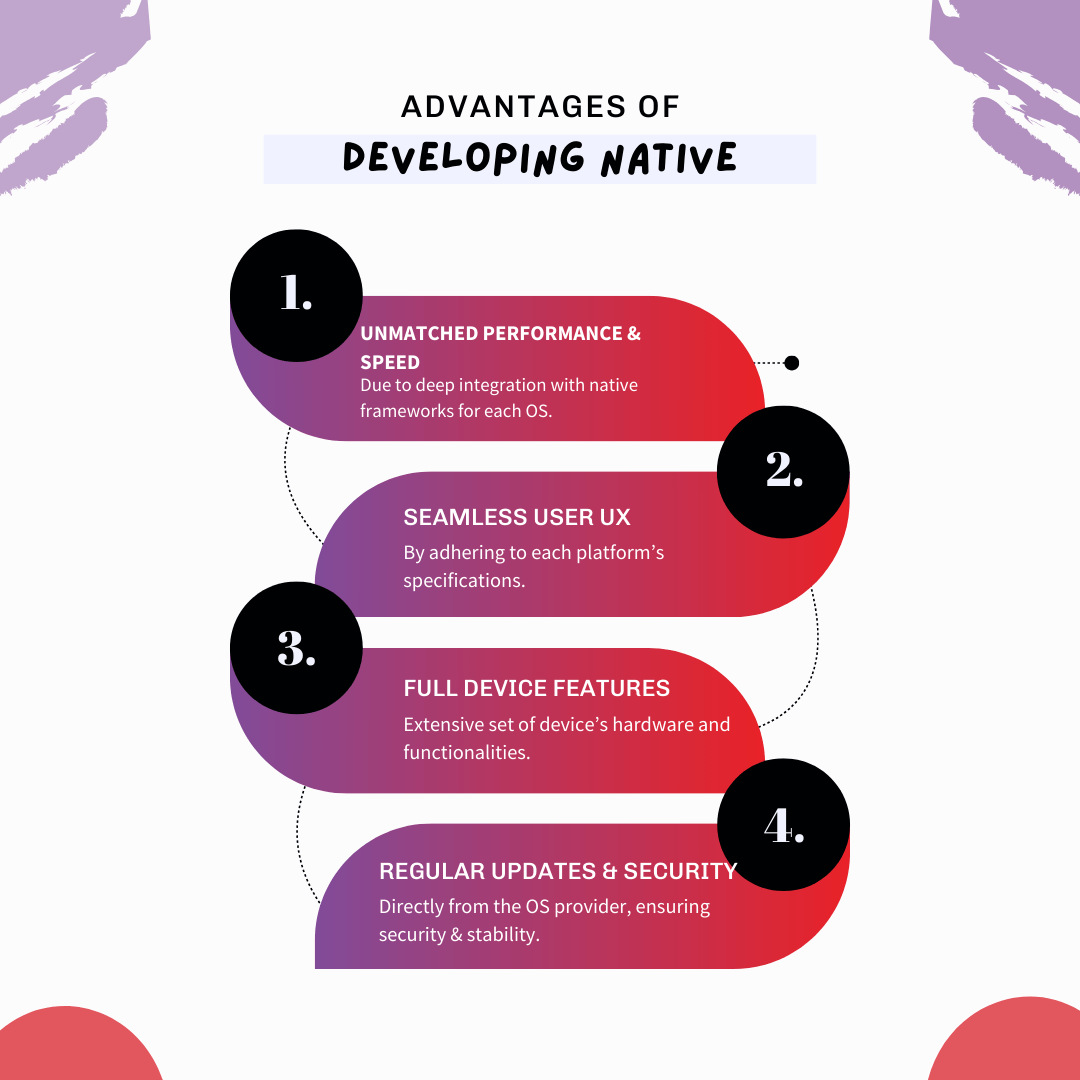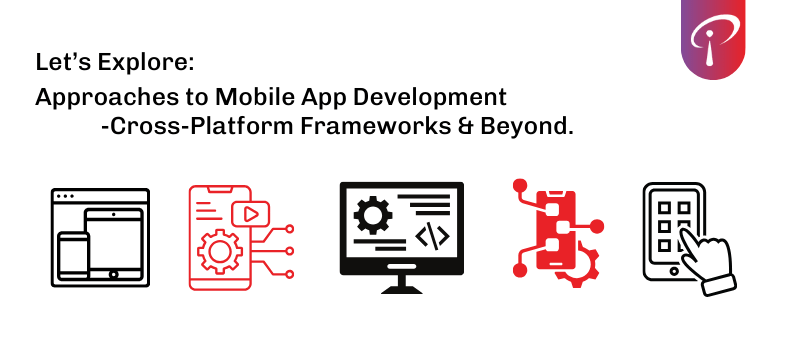Mobile App Development Approach: Cross-platform and Beyond
The mobile app market hasn’t stopped booming, with over 4.88 billion active users (that’s almost half of the world’s population!). This growth isn’t surprising- mobile apps have become an integral addition to our daily lives, starting from setting alarms, to shopping online, to even giving interviews on our handheld screens.
With this, as our dependencies on this tech increase, the development is getting better day-by-day with new gen tech like gen AI, AR/VR taking over. Thus, mobile app development is bound to become even more sophisticated, detailed & in-demand.
To capture a slice of this massive audience, the app development process needs to be planned, and well-crafted by integrating new gen technologies to enhance the functionality, performance & UX. Dedicated developers must keep in mind how there exist different needs & functionality requirements to consider while choosing a proper fit.
Here’s where the various mobile app development approaches come in.
Developers trust and rely on different development approaches for different mobile apps, serving various purposes. To create these digital tools, different approaches offer a range of benefits, like faster responsiveness, cost-efficiency & high-quality user experience.
These approaches act as efficient guides to develop the most intuitive, fast, and well-tested mobile app. Understanding why and which to choose can give you a superpower to develop a mobile app that gives the desired impact.
Let’s explore how developers choose the right mobile app development approach.
Exploring the
Mobile App Development Approaches
Understanding different approaches & their respective trade-offs is extremely crucial to take an informed decision owing to your app’s unique needs.
Here’s why:
1. Keeping those Costs in Check
With mobile app development costing between $10,000-$49,000, selecting the most cost-effective development method impacts your monetary resources.
Native apps typically use more monetary resources, however, building PWAs isn’t that labor-intensive in comparison.
2. How fast can you launch?
This competitive mobile app development industry’s one of the major considerations is the time taken to develop. Understanding how quickly each approach can develop an app can allow you to gain a first-mover advantage.
This is why many prefer launching a MVP quickly to gain the market share firsthand, while simultaneously building the core app.
3. Performance & UX
In the end, the app will attract users if it is fast & responsive with a seamless UX.
The development approach chosen will severely be affected by this consideration. Many developers, thus, prefer the Native development approach to gain a top-notch performance.
4. Specific Development Needs
In mobile app development, the type of app being developed plays a crucial role. A game may require a graphics-heavy approach using a native approach, while an informational app may be developed using PWAs.
5. App’s Target Audience
Who is it that you’re targeting? If the app is supposed to be used by both Android and iOS users, a cross-platform approach might be preferable. However, one might develop an MVP to simply gain preliminary market insights for iterations.
6. Accessibility to Resources
It’s important to factor in the number of resources accessible. For some, hiring a mobile app development agency might be the best option, while one dedicated developer might even freelance his talents to those who need it.
7. Developer’s Expertise
This consideration might be the most crucial to develop a market-trending mobile app. You must analyze what skills your development team holds to facilitate a smooth development process.
The app’s approach must align with this expertise and skills, allowing for high-quality & fast development.
Thus, it’s important to read through all approaches before selecting the one that’ll make your app stand out in a crowded market while delivering a truly exceptional user experience.
Let’s read about the different mobile app development approaches now:
Pre-built solutions offer an appropriate launchpad for individuals, or entrepreneurs, with an app idea itching their brains. Dedicated developers access ready-made templates allowing them to create a quick MVP-like app to validate a product’s hypothesis.
These mini apps, with a lean development approach, offer the following:
- Rapid development of the basic version, resulting in early testing and validation of core functionalities.
- Valuable data-driven insights from stakeholders & users to cater to iterations in design and features before investing significantly.
- Resource optimization for long-term development to facilitate market penetration & customer retention.
But there exists a trade-off between speed & flexibility. While pre-built solutions allow rapid deployment & cost-efficiency, the following challenges persist:
- Less functionality- Since these solutions cater to the masses, they might not offer niche-specific requirements to build elaborate applications.
- Customization Issues- While building on pre-made solutions, developers essentially adapt to the template’s needs to fit the mold, and not the other way around.
- Integration challenges- Prebuilt solutions often lack the level of compatibility required to integrate new-gen technology, making the process complex & time-intensive.
- Vendor Lock-in- Having invested in one pre-built solution, one tends to get dependent on the vendor for future updates, bug fixes, and feature development.
- Limited scalability- As a corollary, scalability becomes less accessible due to upgrades & additional features being unavailable, or costly.
- Limited Control over UI, functionality, and data security.
If the MVP proves to be a success and needs tailored features, three main development approaches come to mind:
A)
Native App Development
This approach involves developing unique apps tailored for different operating systems like Android or iOS. Each of the platforms carry their own sets of requirements including guidelines, development tools, design requirements, and environment.
This provides some advantages like:
However, the trade-off here is:
1. Developing separate native apps for different platforms taking more manpower & resources as compared to hybrid approaches.
2. Maintenance Overhead- Maintaining and updating different apps is a complex & ongoing process.
3. Limited Reach- Since separate app store submissions are required for each platform, it potentially limits the targeted audience base.
Who should develop Native?
- Businesses with resource-intensive app development with demanding functionality.
- Companies who want top-notch performance, with platform-specific UX.
- Apps that require deep integration with specific devices’ hardware features.
B)
Progressive Web Applications(PWAs)
PWAs essentially transform websites into experiences with app-like functionalities. This allows easy user access to the PWA through a browser for a more app-centric feel.
These bridge the gap between websites & native apps, whilst offering:
- Fast Performance: These leverage service workers to facilitate offline functionalities & push notifications. This results in app responsiveness even in low net connectivity.
- Ease to Install: PWAs are available for download directly from a website, making them incredibly accessible from any browser across devices.
- Native-like usage: They can create experiences that rival native apps, through additional features like cameras, notifications, etc.
- Lower development costs: Since developers use a single codebase for all platforms, PAWs tend to be more cost-effective compared to actual native apps.
IT product engineering companies can easily create an app-like experience without handling a heavy price tag of developing native. This becomes an attractive option for companies wanting to invest a little.
The thing is, PWAs might not offer the same intensity of functionality across all devices, as compared to native apps-
- Offline Limitations: PWAs offer limited offline functionality as compared to native apps.
- Lower App Store Visibility: PWAs often don’t get listed in traditional app stores like Google Play Store or the Apple App Store, limiting their chances of getting discovered.
- Platform-wise Differentiations: Minor variations may occur in browsers across platforms.
Who should consider PWAs?
- – Companies looking for a fast, cost-efficient development approach to reach a broad audience.
- – Companies who offer simple or information-based content on apps.
- – When the preference is on some offline functionality at least.
C)
Cross-platform app development
This approach lets dedicated developers use a dingle codebase to develop the same application for various operating systems, often supported by existing online libraries and reusable components.
By developing cross-platform, you necessarily allow platform-specific code translations into languages utilized by each platform you utilize.
It offers a compelling alternative to native app development:
- Faster Development: Due to shared code & pre-built components, dedicated developers can streamline the process, also saving valuable resources.
- Broader Reach: Cross-platform apps are able to target multiple platforms & user bases at a single time, allowing for maximum market penetration.
- High Cost Effectiveness as compared to native app development
Some cons to consider:
- Performance Issues: They may not achieve the same performance as native apps.
- Less Customization: Some platform-specific features might be not available as compared to native apps.
When is cross-platform a good choice?
- – For companies wanting to build apps with moderate performance.
- – To quickly test and iterate with the use of MVPs (Minimum Viable Products) across platforms.
- – To read a wide user base across different operating systems.
To Conclude,
We just saw how different approaches can be a right choice at times, while also having their own vices for specific considerations. Companies usually spend a lot of time deciding which approach would benefit them in the long run.
But how do we know it’s the right choice?
You may want to depend on an expert mobile app development company.
Here we come!
Having built over 300 apps, at iProgrammer, you’ll be surrounded with experienced experts, offering free consultations whenever you require. With our expansive team, we utilize time-tested methodologies to make your lives easier & result-oriented.
Trust us with your developmental challenges, cost-efficiencies, and basically to reach all the goals your business wishes to. Read our success stories to know our expertise here.









